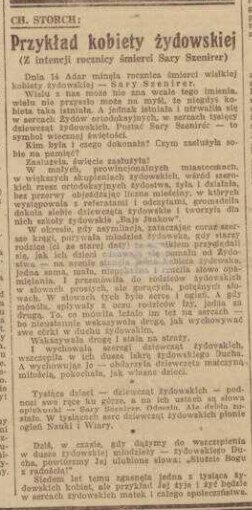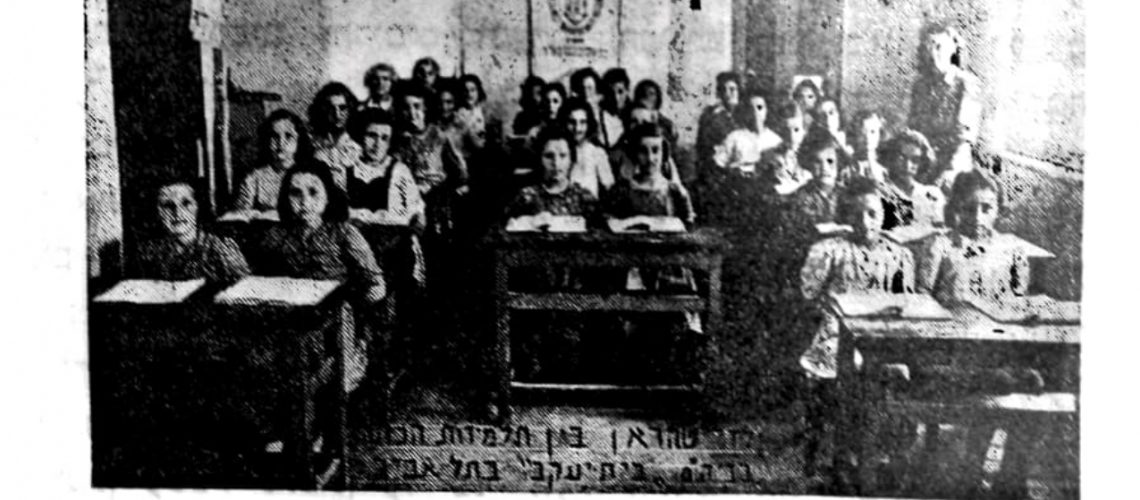The brief article in the Gazeta Żydowska marking the seventh anniversary of Sarah Schenirer’s death, on Adar 14 (which fell on March 3 that year) is not unusual in itself. The writer, Chaim Storch, praised Sarah Schenirer’s remarkable accomplishments, her travels and speeches throughout Jewish Poland, the impression she made on parents mourning the increasing distance of their daughters from the spirit of Torah, the maternal warmth with which she embraced these girls and young women. All of the points he made are familiar enough from the encomiums by which Sarah Schenirer was remembered in interwar Poland and in the various Orthodox publications that arose after the war. What distinguishes this ode to the founder of Bais Yaakov is the context of its publication in March of 1942, deep into the Holocaust. What do we make of the appearance of such an article, familiar in what it says, shocking in what it doesn’t say, under the catastrophic conditions of that place and time?

To understand this article requires recognizing that Gazeta Żydowska was a Jewish propaganda magazine that appeared two or three times a week from July 1940 to August 1942, under the aegis of the Jewish Councils (Judenräte) of the ghettos of Krakow and Warsaw, under Nazi supervision. But while it published deceptive articles about, for instance, “the sanitary care of the Jews of Krakow” during the very periods of mass deportation, the magazine was also permitted a relatively free hand in publishing literature and articles on social and cultural matters, as long as these kept up a façade of compliance and normalcy. Along with this article about Sarah Schenirer, Storch also published literary pieces in the journal. In this case, too, he seemed to be walking within the line drawn by the censors: Storch spoke about Sarah Schenirer’s accomplishments without mentioning that her schools had been shut down in many locations but also occasionally managed to operate underground; that her successor at the helm of the movement, Yehuda Leib Orlean, had been severely beaten in Krakow and fled to Warsaw, where he was tended by Bais Yaakov teachers; that Sarah Schenirer’s slogan—quoted in the article—“Worship God with joy”—was undergoing existential challenges that she could hardly have imagined.
Was he nevertheless suggesting that some of the love of Torah that Sarah Schenirer had inspired in her students was also manifesting itself in spiritual if not physical resistance? Michal Shaul argues that the fascination with Sarah Schenirer was a feature of post-Holocaust life, when she functioned as a bridge between an irretrievable past and a broken future, for an orphaned generation. But this article is evidence that she was present, on the pages of a Jewish magazine, in the ghettoes, as well. What did she really mean to Storch and his readers, at that moment? The pages of the magazine, produced under the censorship of that period, cannot tell that tale. And Chaim Storch cannot tell us: The database of Holocaust Victims at the United States Holocaust Memorial Museum lists his place and year of death only as 1942, Lwów, seven years after the woman he extolled, and perhaps a month or two after he extolled her.

Gazeta Żydowska 1942 – full translation
Gazeta Żydowska, no. 34, 1942, page 3
Author: Ch. (Chaim) Storch
The Exemplary Jewish Woman
(on the anniversary of Sarah Schenirer’s death)
The 14th of Adar was the anniversary of the death of a monumental Jewish woman – Sarah Schenirer.
Many of us will probably not recognize this name, many of us may not know that such a woman existed. She did exist, though, and she touched the hearts of Orthodox Jews, the hearts of thousands of Jewish girls. The figure of Sarah Schenirer is a symbol of eternal holiness.
Who was she and what did she achieve? How did she earn her place in our memory? For she did indeed earn her holy place!
In small, provincial towns, in bigger Jewish settlements, among the broader Orthodox community, she continuously lived and worked, visiting innumerable places, where she gave her speeches and sermons, gathering young Jewish girls around her and creating for them the Jewish school system, Bais Yaakov.
At a time when assimilation, which was rampant in that period, was tearing away the Jewish youth, when older parents watched as their children slowly distanced themselves from Judaism, a solitary Jewish woman appeared on the scene—small, alone, and humble, yet she voiced a call to action. With simple yet passionate words, she addressed these parents. These words were filled with heart and fire. And when she spoke, tears rolled down parents’ faces. What she said moved them – because she ceaselessly laid out the path of how to raise their daughters in the Jewish spirit.
She showed them the way and kept guard.
She taught many Jewish girls, stoking the spark of the Jewish spirit in their souls. And in educating them, she enveloped them in a maternal love, as though they were her own daughters.
Thousands of children – Jewish girls – raise their hands to the heavens with the name of their mentor on their lips : Sarah Schenirer. She left us, but her work remains. In the hearts of thousands of children the fire of learning and faith brightly burns.
Today, when we try to keep alive the spirit of Jewish youth, we repeat her favourite words: “Serve God with joy!”
Seven years ago, one of many thousands of Jewish women departed from us, but her example will be in the hearts of Jewish mothers and of the whole community.


